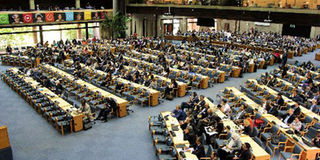It's time we talked about climate impact on the earth

A meeting of the United Nations Environment Assembly in session at the United Nations Environment Programme headquarters in Nairobi on May 23, 2016. PHOTO | MAGDALENE MUKAMI | ANADOLU AGENCY
What you need to know:
- One reason Kenyans don't care about the environment is because of the scarcity of impact data.
If you want to get the most self-controlled man in the world to lose his cool, just say something negative about his mother.
Yet, for some strange reason, our Mother Earth is being defiled every day and we care the less. The earth is dying. Natural fuels are depleted, food is getting less nutritious as the soil on which it grows gets more unhealthy.
For some of us who are more cynical, the universe is unfolding as it should and there is nothing we can do about it. Many of us hear talk about climate change and zone out.
Two main categories of people are pulling at both ends of this mysterious word: there are those who believe that it is our fault that the earth is dying and those who think this is just nature taking its course.
The first group of people are persuaded that human beings can reverse the damage, but the second group has taken a more “Let’s eat, drink and merry make, for tomorrow we die”.
Two weeks ago, thousands of delegates from 174 countries gathered in Nairobi to talk about the weather – or the climate, if you insist. Some 120 government ministers of environment were among the group which spent five days deliberating at the United Nations offices in Gigiri.
At the end of the week, the group left the building more persuaded that it is not only our fault that the earth is dying, but it is up to us to do something about it. Few Kenyans even noticed that the conference happened.
Almost five years after her death, not many people understand why Wangari Maathai was so obsessed with trees or why she got a Nobel Peace prize for it. Many of us look at the online rants of “elephant lady” Paula Kahumbu and shrug in bewilderment. We assume she is obsessed with elephants.
One reason Kenyans do not care about the environment is because of the scarcity of impact data. We care about a car accident when the number of people who die in it is higher. The Garissa University terror attack is etched in our memories not because the victims were so many, but because they were young. But there is little data on the effects of climate change on people’s lives.
Yet, I learnt from the just-concluded United Nations Environment Assembly that more than 14,000 Kenyans die every year from health conditions traceable to indoor air pollution. But, for some strange reason, we don’t care.
Studies done in other countries have shown a direct correlation between the IQs of children and their exposure to lead found in batteries and paint. A recent UN report revealed that some 143,000 people die every year from lead poisoning. Indeed, research studies and more data on the environmental impacts of human activities could help Kenyans appreciate the problem better. Why is it so difficult to care about the environment? Perhaps it is because climate change is a problem that is too big to notice. Most human beings are wired to care easily about problems they can define and shoot down with a witty tweet on social media. Unfortunately, climate change does not give us that option. As we observe the World Environment Day today, the least we can do is talk about our mother.




